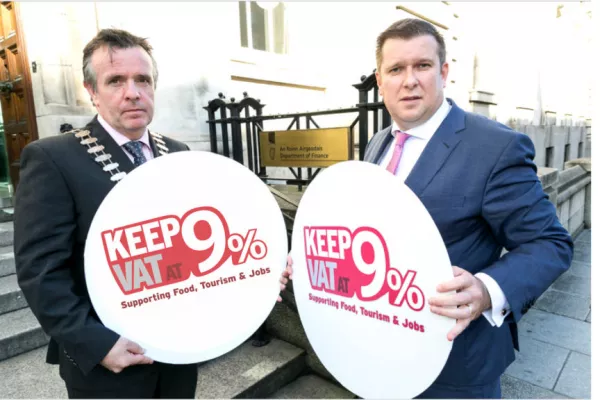A recent report published by the Restaurants Association of Ireland has identified the direct and indirect employment associated with the introduction of the reduced VAT rate of 9% in the accommodation and food services sector in July 2011. The report examines the level of employment in the sector in Q1 2018 along with its contribution to the Exchequer while looking at the change in employment in the sector between Q2 2011 and Q1 2018.
In Q1 2018, 171,700 workers were employed directly in the accommodation and food services sector, which accounted for 7.7% of total employment in the economy. The total gross annual wage paid to those workers was €3.98 billion and the total net annual wage paid to those workers was €3.53 billion. The payroll taxes accruing to the Exchequer from this employment was €877 million. During this time, the indirect employment supported by the direct employment in the sector is estimated at 78,982.
Employment Increase
Between Q2 2011 and Q1 2018, the number of people working in the accommodation and food Services sector increased by 54,400 nationally, taking total employment from 117,300 to 171,700 on a seasonally adjusted basis. The total gross annual wage paid to those extra workers is €1,260 million, while the total net annual wage paid to those extra workers is €1,118 million. The payroll taxes accruing to the Exchequer from this extra employment was €278 million. At a national level, the increase in indirect employment as a result of the job creation in the accommodation and food services sector is estimated at 25,024, bringing the total increase in direct and indirect employment to an estimated 79,424.
"Major Driver"
Speaking about the success of the reduced VAT rate in recent years, Adrian Cummins, chief executive of the Restaurants Association of Ireland, said, “In terms of creating new jobs in the hospitality sector, the introduction of the 9% VAT rate in July 2011 has been a major driver of local employment growth. In Q1 2018 alone, 171,700 workers were employed directly in the accommodation and food services sector and the total gross annual wage paid to those workers was €3.98 billion. Total employment in the accommodation and food services sector has increased by 54,400 people between Q2 2011 and Q1 2018. The impact the reduced VAT rate has had on this growth cannot be underestimated.”
Overseas Trips
The report also states that there has been strong growth in the number of overseas trips to Ireland since the 9% VAT rate was introduced in July 2011, resulting in an increase of €1.97 billion in overseas tourist expenditure. It notes that, between 2011 and 2017, there has been an increase of 52.7% in the number of overseas visitors to Ireland and while this growth is due to a number of factors, the impact that the reduced VAT rate has had on the competitiveness of the Irish tourism product is significant.
The 2018 report recognises tourism as Ireland’s most important indigenous sector, providing considerable employment across Ireland. It states that, in the context of a country where there is a strong imperative to boost employment and economic activity, the ongoing health of the sector is of vital importance. The RAI believe that the lower VAT rate is an important component of the tourism sector and the introduction of an increased VAT rate would only serve to undermine the competitiveness of the industry and the viability of many small businesses across Ireland.
© 2018 Hospitality Ireland – your source for the latest industry news. Article by Dave Simpson. Click subscribe to sign up for the Hospitality Ireland print edition.









